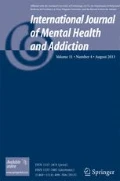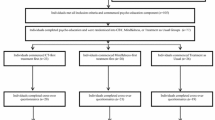Abstract
In recent years, mindfulness meditation has shown to be a promising approach for alleviating disability and dysfunction associated with a wide range of medical and psychiatric conditions. To date, there have been no controlled clinical studies of mindfulness for problem gambling (beyond case studies) despite the well-established presence of irrational beliefs and cognitive distortions which would suggest that mindfulness interventions would be particularly suitable. In the present study, a group, five-session, mindfulness intervention was integrated into an empirically-effective cognitive-behavioral therapy for problem gamblers. Compared to a wait list control the mindfulness intervention significantly reduced the severity of gambling, gambling urges and psychiatric symptoms at end-of-treatment. At the 3-month follow-up combining the results of both groups the results were maintained. In addition, a significant decrease in the proportion of the sample meeting criteria for pathological gambling was found. Those individuals who reported some mindfulness practice post-treatment showed significantly better clinical outcomes than did those who did not report any mindfulness practice suggesting that mindfulness did play a role in the outcomes observed. Taking into consideration the multiple methodological limitations of this pilot study there is sufficient evidence to further investigate the potential efficacy of mindfulness interventions for problem gambling.
Similar content being viewed by others
Notes
Statistical assumptions for the use of non-parametric tests were met; hence, t-tests were used to test for mean differences.
References
Baer, R. A., Smith, G. T., & Allen, K. B. (2004). Assessment of mindfulness by self-report: The Kentucky Inventory of Mindfulness Skills. Assessment, 11, 191–206.
Breslin, F. C., Zack, M., & McMain, S. (2002). An information-processing analysis of mindfulness: Implications for relapse prevention in the treatment of substance abuse. Clinical Psychology: Science and Practice, 9, 275–299.
Daughters, S. B., Lejuez, C. W., Lesiur, H. R., Strong, D. R., & Dolvensky, M. J. (2003). Towards a better understanding of gambling treatment failure: implications of translational research. Clinical Psychology Review, 23, 573–586.
de Lisle, S. M., Dowling, N. A., & Allen, J. S. (2011). Mindfulness-based cognitive therapy for problem gambling. Clinical Case Studies, 10, 210–228.
de Lisle, S. M., Dowling, N. A., & Allen, J. S. (2012). Mindfulness and problem gambling. Journal of Gambling Studies, 28, 719–739.
Deikman, A. J. (1982). The observing self. Boston: Beacon.
Derogatis, L.R. (1983). SCL-90-revised version manual-1. Johns Hopkins University School of Medicine.
Grabovac, A. D., Lau, M. A., & Willett, B. R., (2011). Mechanisms of mindfulness: A Buddhist psychological model. Mindfulness.
Hayes, S. C., Strosahl, K. D., & Wilson, K. G. (1999). Acceptance and commitment therapy: An experiential approach to behavior change. New York: Guilford Press.
Hodgins, D. C., & el-Guebaly, N. (2004). Retrospective and prospective reports of precipitants to relapse in pathological gambling. Journal of Consulting and Clinical Psychology, 72, 72–80.
Hodgins, D. C., & Holub, A. (2007). Treatment of problem gambling. In G. Smith, D. C. Hodgins, & R. Williams (Eds.), Research and Measurement Issues in Gambling Studies (pp. 372–391). New York: Elsevier.
Joukhador, J., Blaszczynski, A., & Maccallum, F. (2004). Superstitious beliefs in gambling among problem and non-problem gamblers: Preliminary data. Journal of Gambling Studies, 20, 171–180.
Kabat-Zinn, J. (1990). Full catastrophe living: Using the wisdom of your body and mind to face stress, pain, and illness. New York: Delacorte.
Keng, S.-L., Smoski, M. J., & Robins, C. J. (2011). Effects of mindfulness on psychological health: A review of empirical studies. Clinical Psychology Review, 31, 1041–1056.
Lakey, C. E., Campbell, W. K., Brown, K. W., & Goodie, A. S. (2007). Dispositional mindfulness as a predictor of the severity of gambling outcomes. Personality and Individual Differences, 43(7), 1698–1710.
Pallesen, S., Mitsem, M., Kvale, G., Johnsen, B. H., & Molde, H. (2005). Outcome of psychological treatments of pathological gambling: a review and meta-analysis. Addiction, 100, 1412–1422.
Petry, N. M. (2005). Pathological gambling: Etiology, comorbidity and treatment. Washington, DC: American Psychological Association.
Raylu, N., & Oei, T. P. (2004). The gambling related cognitions scale (GRCS): development, confirmatory factor validation and psychometric properties. Addiction, 99, 757–769.
Segal, Z., Williams, & Teasdale, J. (2002). Mindfulness-based cognitive therapy for depression. New York: Guilford Press.
Shaffer, H., Hall, M. N., & Bilt, J. V. (1999). Estimating the prevalence of disordered gambling behavior in the United States and Canada: A Research Synthesis. American Journal of Public Health, 89, 1369–1376.
Shapiro, S. L., Carlson, L. E., Astin, J. A., & Freedman, B. (2006). Mechanisms of mindfulness. Journal of Clinical Psychology, 62, 373–386.
Shonin, E., Van Gordon, W., & Griffiths, M. D. (2013a). Buddhist philosophy for the treatment of problem gambling. Journal of Behavioural Addictions, 2, 63–71.
Shonin, E., Van Gordon, W., & Griffiths, M. D. (2013b). Cognitive behavioral therapy (CBT) and meditation awareness training (MAT) for the treatment of co-occurring schizophrenia and pathological gambling: A case study. International Journal of Mental Health and Addiction. doi:10.1007/s11469-013-9460-3. Published online 06 December 2013.
Toneatto, T. (1999). Cognitive psychopathology of problem gambling. Substance Use and Misuse, 34, 1593–1603.
Toneatto, T. (2012). Gambling. In S. C. Hayes & M. Levin (Eds.), Acceptance, mindfulness, values, and addictive behaviors: Counseling with contemporary cognitive behavioral therapies. Oakland: New Harbinger Publications.
Toneatto, T. (2013). Mindfulness. In P. M. Miller (Ed.), Encyclopedia of Addiction. London: Elsevier.
Toneatto, T., & Gunaratne, M. (2009). Does the treatment of cognitive distortions improve clinical outcomes for problem gambling? Journal of Contemporary Psychotherapy, 38, 221–229.
Toneatto, T., & Ladouceur, R. (2003). The treatment of pathological gambling: A critical review of the literature. Psychology of Addictive Behaviors, 284–292.
Toneatto, T., & Nguyen, L. (2007). Does mindfulness meditation improve anxiety and mood symptoms? A review of the controlled research. Canadian Journal of Psychiatry, 52, 260–266.
Toneatto, T., Vettese, L., & Nguyen, L. (2007). The role of mindfulness in the cognitive-behavioral treatment of problem gambling. Journal of Gambling Issues, Issue, 19, 91–100.
Author information
Authors and Affiliations
Corresponding author
Rights and permissions
About this article
Cite this article
Toneatto, T., Pillai, S. & Courtice, E.L. Mindfulness-Enhanced Cognitive Behavior Therapy for Problem Gambling: A Controlled Pilot Study. Int J Ment Health Addiction 12, 197–205 (2014). https://doi.org/10.1007/s11469-014-9481-6
Published:
Issue Date:
DOI: https://doi.org/10.1007/s11469-014-9481-6




